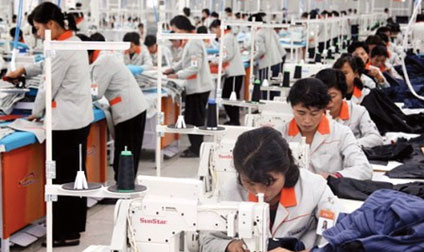North Korea workers fail to turn up at Kaesong
North Koreans have failed to report for work at Kaesong Industrial
Complex, suspending one of the few points of co-operation between the
Koreas.
 The complex is a joint industrial park and there are more than 120
South Korean companies that operate there, employing 53,000 North Korean
workers. It is seen as a crucial source of hard currency for North
Korea. The move is the latest in a series of provocations that have
raised tensions in the Korean peninsula and the region. The complex is a joint industrial park and there are more than 120
South Korean companies that operate there, employing 53,000 North Korean
workers. It is seen as a crucial source of hard currency for North
Korea. The move is the latest in a series of provocations that have
raised tensions in the Korean peninsula and the region.
“As of now, no North Korean workers have reported to work this
morning,” a spokesperson for the South Korean Unification Ministry said.
The ministry added that 77 South Korean workers would leave the zone
on Tuesday, but 479 were still inside Kaesong.
Investment risk
The complex was launched in 2003 and was largely funded by South
Korea. Seoul has said the purpose of the complex was to develop a joint
industrial park where South Korean companies could manufacture their
products using North Korean labour.
It said that would help North Korea start to reform its economy,
which is in a dire state, and ease tensions between the two Koreas.
South Korea has given incentives to companies to try and encourage
them to set up operations there. These include political risk insurance
to cover losses in their investment. As a result, if the project is
threatened, South Korea also tends to lose. South Korean President Park
Geun-hye said the boycott by North Korea would harm the country's
credibility.
“Investment is all about being able to anticipate results and trust
and when you have the North breaking international regulations and
promises like this and suspending Kaesong while the world is watching,
no country in the world will invest in the North,” she told a cabinet
meeting in Seoul.
“I don't know what to do, honestly. I can't simply tell my workers to
leave or stay,” an executive from a South Korean clothing firm told
Reuters news agency.
Last symbol
“North Korean workers didn't talk a lot, but they appeared to have
complaints about Kaesong being closed,” the agency also quoted South
Korean worker Sing Dong-chul as saying. “They worried whether they would
be working or not.”
Seen as a litmus test of relations on the Korean peninsula, Kaesong
also provides hard currency for the North through taxes and workers’
wages.
South Korean companies pay more than $80m (£52m) a year in salaries.
As a whole, the Kaesong complex produced $470m worth of goods last year.
It accounts for nearly all inter-Korean trade.
The BBC's Lucy Williamson, reporting from Seoul, said that for almost
a decade the joint industrial zone has chugged on, through North Korean
nuclear tests, rhetoric, and even military clashes with the South. But
now the last symbol of joint inter-Korean co-operation is effectively
suspended, she said.
North Korea has blocked access to South Koreans working there since
Wednesday. On Monday it said it would withdraw all its own employees and
suspend operations in the zone. A decision would come later on whether
it would shut it down for good.
North Korea has expressed anger at South Korean media reports that
the North would not shut down Kaesong because its struggling economy is
heavily dependent on the complex.
The United Nations imposed tough sanctions on North Korea last month
following its third nuclear test.
Pyongyang has responded to this and to joint military exercises
between South Korea and the US with escalating rhetoric. It has
threatened to use nuclear weapons and said it would restart a nuclear
reactor.
The BBC's Rupert Wingfield-Hayes says Japan has deployed anti-missile
systems in Tokyo.
the North has also shut down an emergency military hotline between
Seoul and Pyongyang.
Last week, it warned it would not be able to guarantee the safety of
foreign embassy staff after April 10, and that countries should begin
evacuating their diplomatic staff.
Over the weekend, the US cancelled a scheduled test of its Minuteman
3 ballistic missile, citing concerns that it could be misinterpreted by
Pyongyang.
Meanwhile, Japan said it has deployed US-made Patriot anti-missile
batteries in Tokyo and other parts of the country to guard against North
Korea launching ballistic missiles.
Prime Minister Shinzo Abe said that the government was “fully
prepared to protect the lives and safety of the Japanese people”.
BBC
|


